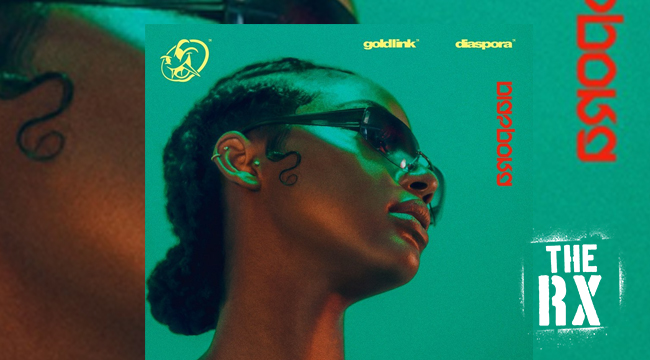
The RX is Uproxx Music’s stamp of approval for the best albums, songs, and music stories throughout the year. Inclusion in this category is the highest distinction we can bestow, and signals the most important music being released throughout the year. The RX is the music you need, right now.
In all the recent discussion about appropriation, the question often arises: What’s the difference between appropriation and appreciation? The line between the two seems so hazy that it may as well not exist, but if there is one, the best example of the “appreciation” side might just be the newest album from DMV rapper GoldLink. On Diaspora, GoldLink mines inspiration in African-rooted music from all over the world to create a one-of-a-kind celebration of all of the cultures and styles, grounded by his own unique vision of eclectic unity.
GoldLink is a quirky rapper from the DC area whose chain-rattle flow anchored the 2017 hit “Crew” and his standout album from the year, At What Cost. The eclectic production and unusual patter of his vocal cadence were well-received by critics, but he was unable to secure a second hit or push At What Cost into the top 100 of Billboard, despite his earlier appearance on XXL’s 2015 Freshman cover. The experimental vibes of his debut album hit all of the right notes to impress his hometown crowd, but unfortunately went over the general audience’s heads.
Rather than surrender to the demands of commercial radio, however, GoldLink takes a different tack on Diaspora, aiming to expand his reach globally rather than domestically. Why aim for LA or New York radio when there’s a whole international market to appeal to — especially when it’s so much more accepting of unusual sounds and wide-ranging influences? In tapping into African and Caribbean styles, both contemporary and traditional, GoldLink opens up several new avenues for his chattering DMV patois to explore. However, unlike Drake, who is also well-known for playing to his diasporic influences, GoldLink keeps himself grounded in his home style, letting the sonic palette of his production do the heavy lifting, which helps him to avoid the pitfalls of sounding inauthentic.
“Zulu Screams,” for instance, ties elements of house and dance music to Nigerian pop — especially through the addition of South London R&B/Afropop vocalist Maleek Berry on the hook and a Bibi Bourelly bridge in the Congolese language of Lingala. This egalitarian vision of African unity carries over to another single, “U Say,” featuring Jay Prince, who brings a downtempo lounge vibe to the proceedings. GoldLink tacks on a surprisingly organic-sounding Tyler The Creator verse that features all of T’s signature wit but smartly excludes his more lurid lyrical proclivities.
“Yard” finds GoldLink adopting the dancehall lingo favored by Drake minus the affected accent (we know that Toronto is full of Caribbean people, but Drake isn’t one of them and sounds cheesy when he does it) over what sounds like a sample of the riddim from Chaka Demus and Pliers’ iconic 1994 hit “Murder She Wrote.” Later, GoldLink recruits Nigerian Afropop singer Wizkid for a downtempo, straightforward R&B slow burner on “No Lie.” Throughout the runtime of Diaspora, the DMV rapper connects disparate performers and sounds from throughout the … ahem … African diaspora to highlight the aspects that link African-descended peoples and genres all over the world.
When he does get back to locally-flavored, more traditional rap, as he does on the Pusha T-featuring “Cokewhite” and on the thundering “Rumble,” his breathless delivery weaves through the propulsive beats with the urgency that his debut album was missing. It’s hard not to get caught up in the energy of “Maniac,” even when that DMV lilt obscures the context of ‘Link’s language arts. By dipping into each bag of genre signifiers as necessary to find inspiration, GoldLink dances on the thin line between making music that nods to its influences, rather than wading into the murky waters of simulation and pretentious erasure. In doing so, Diaspora demonstrates that the best culture clash is the kind from which every side takes a little something to become richer and the whole is greater than the sum of its parts.
Diaspora is out now via RCA Records. Get it here.






